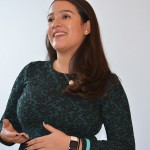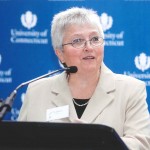Members of student organization Leadership In Diversity (L.I.D.) are actively working with Neag School faculty to boost diversity in the Neag School of Education’s student body.
This spring, Marissa Gadacy ’17 (CLAS) and Neag School of Education assistant professor Devin Kearns will collaborate on research examining aspects of elementary school students’ reading comprehension skills, thanks to funding from UConn’s Office of Undergraduate Research, which selected their research proposal for one of its 2016 Social Sciences, Humanities, and Arts Research Experience (SHARE) Awards.
For teachers, administrators, and school psychologists, finding an easy, efficient way to track student conduct during the school day has long posed a challenge. Thanks to a new online behavioral assessment tool developed by Sandra Chafouleas, professor in the department of educational psychology and associate dean for research in the Neag School, and T. Chris Riley-Tillman, a professor at the University of Missouri, educators and school personnel can now quickly and efficiently monitor behaviors key to school success – with virtually no paperwork.
Here are news and notes from our alumni, faculty, staff, and students. We are proud of all the amazing accomplishments by our Neag family. If you have an accolade to share, we want to hear from you! Please send any news items (and story ideas) to neag-communications@uconn.edu.
For nearly 20 years, Valerie Pichette served as executive assistant at UConn’s Neag School of Education – first with Dean Richard Schwab and later with former Dean Thomas DeFranco – as well as a longtime mentor to innumerable students and friend to many colleagues campus-wide. Pichette passed away on Sunday, Nov. 15, 2015. In remembrance of her longtime dedication to the University, the Neag School announced the launch of a new endowed scholarship in her name, the Valerie J. Pichette Scholarship Fund.
Connecticut lawmakers and education leaders seeking to reduce the use of restraints and seclusion in public schools were encouraged this week by two UConn experts who offered a successful, research-driven alternative to addressing disruptive student behaviors. More than 100 people attended a two-hour presentation at the state Capitol on Jan. 27, where professors George Sugai and Nicholas Gelbar described how a prevention and de-escalation strategy known as Positive Behavioral Interventions and Supports (PBIS) can significantly reduce incidents of seclusion and restraint, while simultaneously improving the classroom climate for all students.
This time of year, millions of high school students around the country are anxiously waiting to learn whether they will be accepted into the college or university of their choice. For many, high school grades and standardized test scores will be the initial benchmarks that decide their fate. But UConn professor of educational psychology James C. Kaufman says traditional college admission practices are capturing only part of a student’s overall potential.



